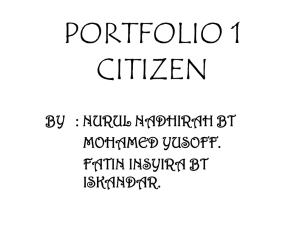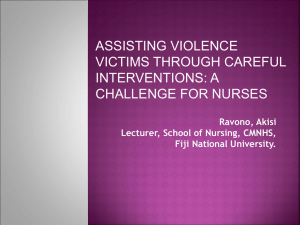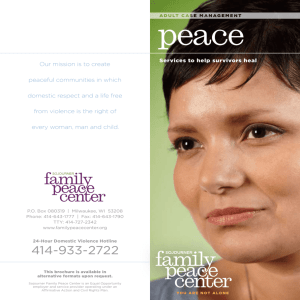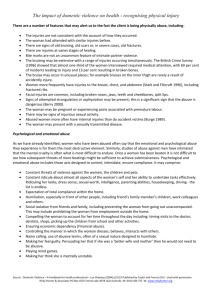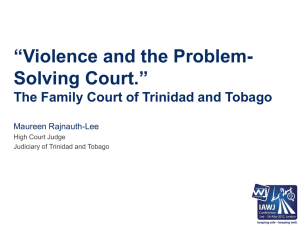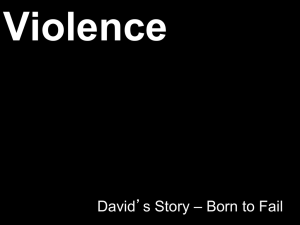Presentation
advertisement
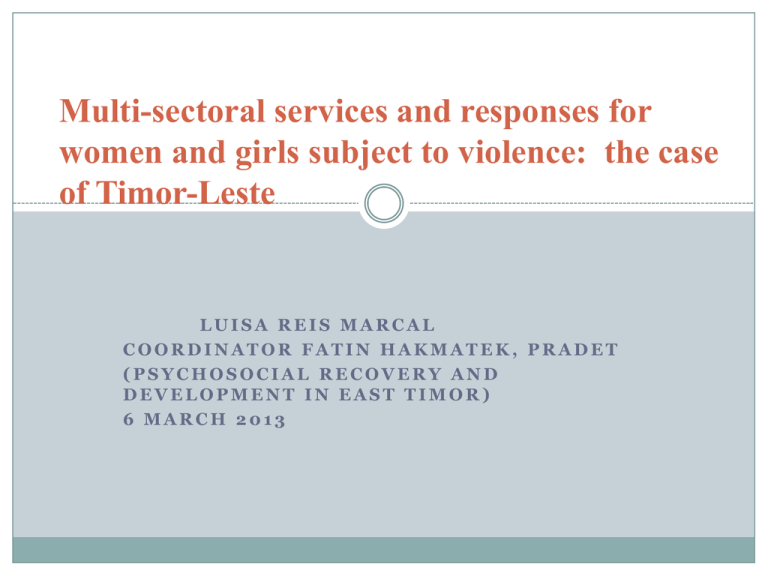
Multi-sectoral services and responses for women and girls subject to violence: the case of Timor-Leste LUISA REIS MARCAL COORDINATOR FATIN HAKMATEK, PRADET (PSYCHOSOCIAL RECOVERY AND DEVELOPMENT IN EAST TIMOR) 6 MARCH 2013 Timor-Leste: Introduction and history Small population just over 1 million Young population – mean age 15 years Rural, subsistence agriculture, high rates of poverty and illiteracy Widespread human rights abuses for 24 years during Occupation Major changes after Referendum in 1999 including 80% destruction and UN arriving. Statistics on violence against women 33% of Timorese women have experienced violence since the age of 15 rates being higher in urban areas and women with higher education more likely to report abuse. 29% of women thought that marital rape was acceptable only 24% of women who have experienced violence seek help, with over 80% of them seeking help from their family and only 4% going to the Police and a 1% seeking help from social service agencies Demographic and Health Survey 2010 PRADET’s work on violence against women “Fatin Hakmatek” (Safe Place) started in 2002 with funds from IRC after two years of consultation with women’s NGOs Based in Dili National Hospital PRADET’s focus is on on trauma and mental health issues, which included trauma of domestic violence and sexual assault. Staff have medical background, augmented with training on counseling. Development of the service over time Now expanding to the five District Referral Hospitals with support from AusAID. There will eventually be 6 facilities in the country. In 2012 FH received 293 new referrals, Since opening in 2002 until December 2012 F.H has provided service to a total of 1,544 victims. Services offered Free counseling Medical treatment (injuries, STIs, screening for mental health issues, screening for other non-abuse related health issues) Forensic documentation of injuries and collection of evidence for a possible court case Practical assistance (food, clothes and transportation) Emergency accommodation (up to three nights) Follow-up services and referral to other services Our facilities Purpose-designed facility which keeps the clinical area (for victims) separate from the administrative area (for meetings and visitors) Located in hospital grounds for easier access to medical treatment, XRay, medications, etc. 24 hour security private medical examination room and counselling room a homely environment with space for clients, staff and volunteers to work and relax in. Two sleeping rooms for victims and their children. open five days (Monday-Friday) with an after hours service for emergencies. All Fatin Hakmatek have a 24 hours mobile phone number. key staff positions are Coordinator, Counsellor, Administrator, Driver, Security, Cook/Cleaner Coordinators and Counsellors have medical (midwife or nurse) or legal background International Mentor (part-time) provides clinical and technical support A photo of a Fatin Hakmatek facility Medico-Legal Response Innovation – In 2004 supported by UNFPA, PRADET developed a Medical Forensic Protocol for documentation of injuries and other evidence. PRADET then consulted and obtained support from government including: Min of Health, Min of Justice, SEPI, Prosecutor General and Police. Three languages Training for medical professionals (nurses, midwives, doctors) – accredited by Min of Health and Min of Justice Ongoing discussion about: 1) midwives performing this activity; and 2) clarification that government has authorized PRADET as a non-governmental entity to forensically document potential evidence Some pages of protocol Relationships with other sectors Referral networks – coordination of cases with other Service Providers. Police – Vulnerable Persons’ Units in every district Legal assistance – specialized service for women and children Health care – informal coordination and training MSS – child protection, financial assistance Relationships with other sectors (cont’d) Government – Ministry of Social Solidarity: regulations for services, some funds for services, referrals. Ministry of Health: land for facilities Communities and local leaders – awareness raising activities, with emphasis on school students Advocacy – about issues that things that need to improve. Government and NGOs to improve services Professional training and ongoing support and supervision for staff. Enhanced follow-up services – particularly safety, livelihoods and housing. Special services for particular groups - young women, women with disabilities and women with mental illnesses More work with men for prevention. Only two small organizations are working on this. More Programs for perpetrators not only anger management Areas for further work for improved services (cont’d) Strengthening implementation of National Action Plan on GBV – through making stronger links with service provision and quality of services Better funding for services – long-term, predictable, adequate. Funds need to cover core operating costs, over multiple years. Government will need time to fulfill its obligations. Thank you from the staff at PRADET

